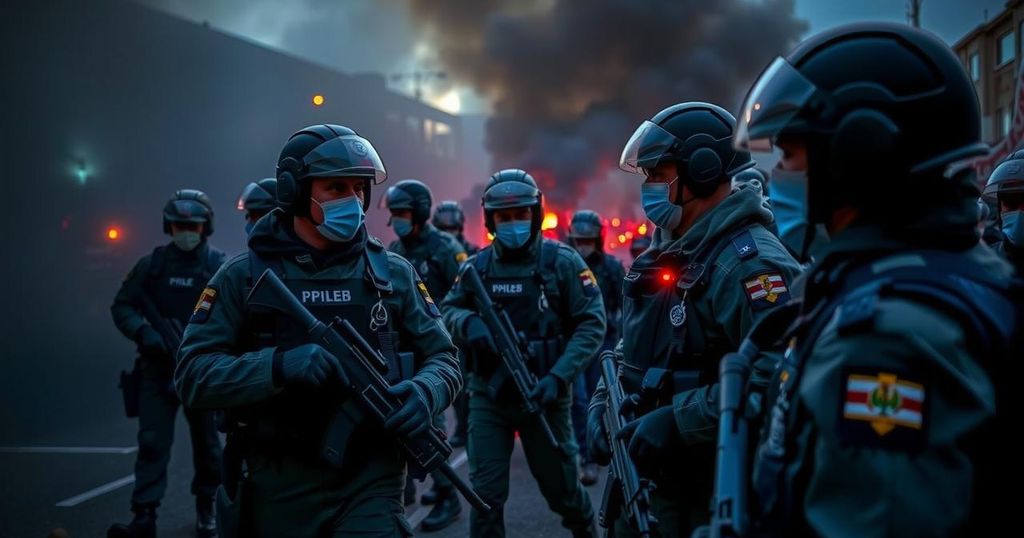Israel’s Escalating Attacks on Lebanese First Responders: A Breach of Humanitarian Law
Israeli military actions in southern Lebanon have drastically impacted emergency responders, particularly the Lebanese Civil Defense, which lacks sufficient resources to conduct their work effectively. After a recent airstrike killed five first responders, allegations of systematic targeting of emergency personnel are being investigated as potential war crimes. The United Nations has noted that over 100 medical workers have been killed since the escalation of conflict, with claims of violations of international humanitarian law regarding the protection of medical personnel. Amidst ongoing hostilities, local volunteers strive to provide essential services despite facing life-threatening risks.
The situation in southern Lebanon has greatly deteriorated, particularly for emergency responders such as those in the Lebanese Civil Defense in the village of Derdghaiya. Due to intensified Israeli military bombardments, the availability of emergency resources, including ambulances, has dwindled. Following a series of bomb detonations linked to Israeli intelligence, which led to casualties in public areas, responders were forced to improvise transportation solutions, utilizing vegetable carts to carry the injured. Bachir Nakhal, a volunteer based in Beirut, sought to raise funds for an ambulance after a bomb attack left first responders without adequate resources. His efforts were successful, leading to the delivery of an ambulance to Derdghaiya, eliciting gratitude from local Civil Defense workers. However, optimism turned to tragedy when an Israeli airstrike struck the Civil Defense center, resulting in the deaths of five first responders, including Abdullah al-Moussawi and his brother. As Nakhal pointed out, there appears to be a deliberate strategy behind these assaults. He argues that Israel’s targeting of emergency personnel extends beyond civilian targeting to incapacitate entire regions. This pattern of violence has raised serious allegations of war crimes. According to the United Nations, over 100 emergency workers have lost their lives in Lebanon since the onset of the conflict related to Israel’s military actions in Gaza, significantly impacting essential services. Imran Riza, the U.N. Humanitarian Coordinator for Lebanon, underscored the protections afforded to frontline workers under International Humanitarian Law (IHL), stressing that they should never be deliberately targeted. In response, the Israeli Defense Forces characterized their military operations as targeting Hezbollah, stating that they endeavor to minimize civilian casualties through warnings prior to attacks. Nevertheless, humanitarian reports indicate that numerous medical facilities have been shuttered due to sustained Israeli strikes. As the conflict continues, volunteers like Nakhal have emerged as vital figures, supplementing a beleaguered public health infrastructure amidst an environment characterized by inadequate resources and rampant hostilities. Emergency services across Lebanon have had to adapt as they respond collectively to the relentless destruction wrought by military actions, facing injury and fatalities themselves while attempting to assist those affected by the violence. Nakhal emphasized the commitment felt among responders despite the perilous circumstances, driven by a sense of duty to assist their communities.
The context of this article highlights the ongoing conflict in Lebanon exacerbated by Israel’s military operations, which have dramatically affected the functioning of emergency services. With a surge in attacks on civilian infrastructure, including those directed toward emergency responders, the situation for healthcare provision in southern Lebanon has become increasingly dire. As tensions have escalated, the operational capacity of the Lebanese Civil Defense, predominantly reliant on volunteers and limited funding, has been severely compromised, resulting in tragic consequences for first responders and the civilian population alike. The tensions exacerbated by the geopolitical context surrounding Israel and Hezbollah also play a crucial role in understanding the motivations behind the attacks on emergency services and the implications of international humanitarian law in these scenarios.
In summary, the Israeli military actions in southern Lebanon have inflicted significant damage on emergency services, resulting in numerous casualties among first responders and raising serious implications regarding compliance with international humanitarian law. The targeting of emergency workers not only undermines healthcare access but exacerbates the humanitarian crisis in Lebanon by destabilizing crucial services during a time of dire need. Volunteers like Bachir Nakhal exemplify the profound commitment exhibited by first responders amidst these challenges, despite the inherent risks associated with their work.
Original Source: theintercept.com








Post Comment